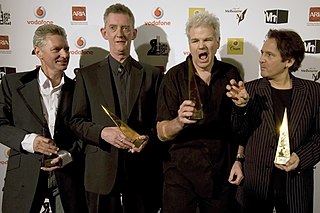
Dragon are a New Zealand rock band which was formed in Auckland in January 1972, and, from 1975, based in Sydney, New South Wales, Australia. The band was originally fronted by singer Graeme Collins, but rose to fame with singer Marc Hunter and is currently led by his brother, bass player and co-founder Todd Hunter. The group performed, and released material, under the name Hunter in Europe and the United States during 1987.
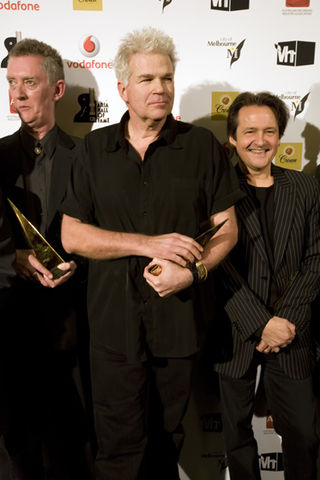
Todd Stuart Hunter is a New Zealand musician and composer known for his involvement in the band Dragon. Their best known songs are "April Sun in Cuba", "Are You Old Enough?", "Still in Love With You", and "Rain". Hunter also composed John Farnham's hit song "Age of Reason" with Johanna Pigott and music for film Daydream Believer (1991) and TV series Heartbreak High (1994–1999).
Marc Alexander Hunter was a New Zealand rock and pop singer, songwriter and record producer. He was the lead vocalist of Dragon, a band formed by his older brother, Todd Hunter, in Auckland in January 1972. They relocated to Sydney in May 1975. He was also a member of the Party Boys in 1985. For his solo career he issued five studio albums, Fiji Bitter, Big City Talk, Communication, Night and Day and Talk to Strangers. During the 1970s Hunter developed heroin and alcohol addictions and was incarcerated at Mt Eden Prison in Auckland in 1978. He was recklessly outspoken and volatile on-stage. In November 1978, during the band's American tour, supporting Johnny Winter, they performed in Dallas, Texas, where "he made some general stage observations about redneck buddies, illegal oral sex and utility trucks" and called the audience members "faggots". Upon his return to Australia, in February 1979, he was fired from the group by his brother, Todd.
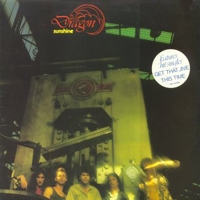
Sunshine is the third studio album by New Zealand rock band Dragon, it was their first album after they had relocated to Sydney, Australia in May 1975. Sunshine was released in February 1977 by CBS Records and peaked at #24 on the Australian national albums charts. The album was certified gold. The single "This Time" had been released in late June 1976, which peaked at #26 on the Australian national singles charts. The second single "Get that Jive" was the best charting peaking at #13 and the third single "Sunshine" reached #36. The album had US and International releases in 1978 on Portrait Records, with "This Time" called "In the Right Direction" and an alternative cover used.
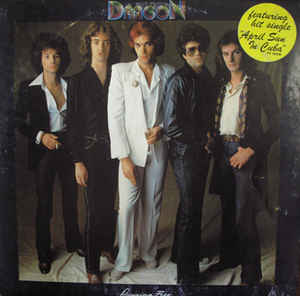
Running Free is the fourth studio album by New Zealand rock band Dragon. It was produced by Peter Dawkins and was originally released in November 1977 on vinyl and re-released on CD in 1989. The album peaked at number 6 on the Australian Kent Music Report. The album was certified triple platinum in Australia.

Snake Eyes on the Paradise Greatest Hits 1976–1989 is a compilation album by rock music group, Dragon, released in 1998. This is the single disc version - there is also a two-disc version called Tales from the Dark Side Greatest Hits and Choice Collectables 1974–1997, which has this disc plus a second disc of album tracks, live, b-sides and other rarities. The album charted at number 70 on the ARIA Charts.

Tales from the Dark Side Greatest Hits and Classic Collectables 1974-1997 is a compilation album by rock music group, Dragon, released in August 1998. Disc one has the same track listing as Snake Eyes on the Paradise Greatest Hits 1976–1989, which was issued in the same year. Disc two consists of album tracks, live, b-sides and other rarities.

Body and the Beat is the seventh studio album recorded by Australian-New Zealand rock band, Dragon. The album was released in June 1984 and peaked at number 5 on the Australian Kent Music Report. The album was certified gold in the week of release and achieved platinum status in Australia. It was the band's first studio album since Power Play in 1979.
This is the discography of Dragon, a popular rock band formed in Auckland, New Zealand, in January 1972, who relocated to Sydney, Australia in May 1975. They were previously led by singer Marc Hunter, and are currently led by his brother, bass player Todd Hunter. They performed and released material under the name Hunter in Europe and United States during 1987.

Dreams of Ordinary Men is the eighth studio album recorded by Australian-New Zealand rock band Dragon. The album was released in August 1986 and peaked at number 18 on the Australian Kent Music Report and was certified platinum in November 1986.
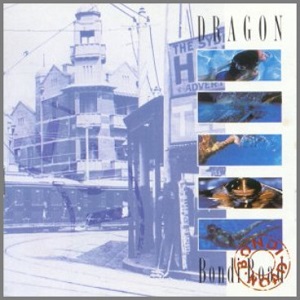
Bondi Road is the ninth studio album by Australian-New Zealand rock band Dragon, released in April 1989. It was the last album of new material to be released during Marc Hunter's lifetime.

"Rain" is a song by New Zealand rock group Dragon released in July 1983 as the first single ahead of their seventh studio album, Body and the Beat. It is co-written by the group's brothers, Marc and Todd Hunter, with Johanna Pigott, Todd's then-domestic partner. "Rain" peaked at number 2 and stayed in the Kent Music Report singles chart for 26 weeks. The song reached number 88 on the United States Billboard Hot 100 charts in mid-1984. For the original single version the group's Kerry Jacobson had provided drums and percussion; he left the group in September 1983 and was replaced by Terry Chambers, who is shown in promotional material including cover art and music videos.
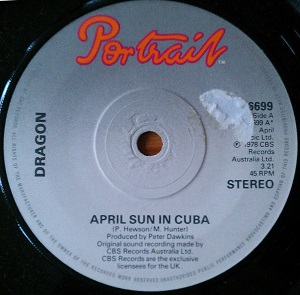
"April Sun in Cuba" is a song recorded by New Zealand group Dragon, released in October 1977. It is the first single to be released from Dragon's fourth studio album Running Free. "April Sun in Cuba" first charted on 7 November 1977, peaking at number 2 on the Kent Music Report Singles Chart and staying on the chart for 22 weeks. It also reached number 9 on the New Zealand singles chart. The b-side of the single, a non-album track called "Telephone", was credited to "Dr. Agony".

"Young Years" is a song by New Zealand group Dragon, released on 3 April 1989 as the second single to be released from the group's ninth studio album Bondi Road (1989). "Young Years" peaked at No. 18 on the ARIA charts and No. 13 on the Recorded Music NZ chart, their final top 40 hit to date.
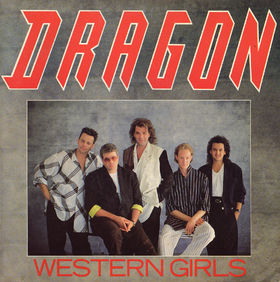
"Western Girls" is a song by New Zealand-Australian rock band Dragon released in November 1986 as the third single from the group's eighth studio album Dreams of Ordinary Men (1986). The song peaked at number 58 on the Australian Kent Music Report and 37 in New Zealand.

"River" is a song by New Zealand-Australian rock band Dragon, released in May 1988. It was released as a non-album single but later appeared on Dragon's compilation album, Snake Eyes on the Paradise Greatest Hits 1976–1989. The song peaked at number 81 on the Australian ARIA Singles Chart.

"Love's Not Enough" is a song by New Zealand band Dragon, released in April 1979 as a non-album single, but later to appear on the compilation album Snake Eyes on the Paradise Greatest Hits 1976–1989. The single charted at number 37 on the Australian Kent Music Report. It was the group's first release without Marc Hunter; he had been replaced by Billy Rogers and Richard Lee. Lee had played on a previous Dragon single, "Are you Old Enough". "Love's Not Enough" had been popular in Dragon's live repertoire prior to Hunter's departure. The b-side of the single, "Four Short Solos" was contrived to give drummer Kerry Jacobson and new members Rogers and Lee some songwriting royalties on a release that the group expected would be a major hit.

So Far is a compilation album by New Zealand group Dragon, released in January 1988 through J&B Records, under licence from CBS Records and PolyGram Records. The album was released as the band's cover version of Kool & The Gang's "Celebration" was in the top 20 in Australia, on the RCA Records label.
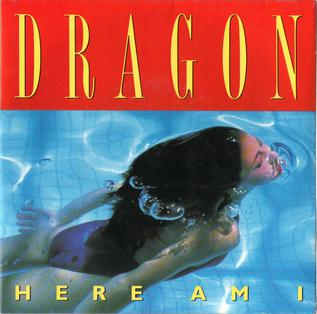
"Here Am I" is a song by Australian-New Zealand group Dragon, released on 5 June 1989 as the third single from the group's ninth studio album Bondi Road (1989). "Here Am I" peaked at No. 77 on the ARIA charts.

"Ramona" is a song by Australian-New Zealand band Dragon released in October 1982. The song was Dragon's first and only single to be released on the EMI Music label. The song peaked at number 79 on the Australian Kent Music Report.


















